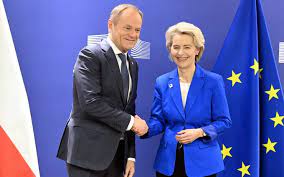Alan Sked
Imagine a scenario in which Sir Keir Starmer wins the next election, and immediately sacks the chairman and board of the BBC, sits by as former ministers are arrested on charges of abuses of power, says he will depose Andrew Bailey, and makes the courts subservient to the EU. The public response, surely, would be one of outrage. Yet similar developments are taking place in Poland, and there has barely been a whimper, not least from Britain’s pro-EU fanatics.
The reason appears to be simple: the man in charge there is a former president of the European Council. He is viewed as a liberal committed to restoring the rule of law which, so the narrative goes, was eroded by the previous “far Right” Law and Justice Party (PiS). And, under the PiS, Poland’s Supreme Court had the temerity to rule that it had primacy over the European Court of Justice. (Germany’s top court maintains the same, but few criticise the Germans.)
Because the PiS government faced accusations of muzzling the press and attempting to silence social media, it was widely rumoured that a victory for Donald Tusk at the 2023 general election was inconceivable.
Yet triumph Donald Tusk did. How odd that, in a supposedly “illiberal” nation, the government left office after losing an election. There was a 75 per cent turnout. Female voters mobilised, many in objection to a 2020 court ruling which almost outlawed abortion. Younger people in big towns and cities threw their support behind Tusk and his Civic Coalition, galvanised by the economic strides the country had taken under the EU, and fears that previous clashes with Brussels might lead to Poland being forced out of the bloc. Political scientists seemed stumped. Poland – with Hungary and Slovakia – had been placed in their category of “illiberal democracies”, after all.
But Tusk did indeed become prime minister in December, promising to overturn the court ruling on abortion, protect the rights of LGBT people and restore relations with the EU (let us not forget his proclamation, as EU Council president, that there was a special place in Hell reserved for Brexiteers). He has faced difficulties, the main ones being that the Constitutional Court is dominated by PiS appointees and that the Polish president, Andrzej Duda, is pro-PiS. Yet it would hardly be ridiculous to expect a degree of disquiet in European liberal circles at how he has sought to surmount these problems. Indeed, according to Tusk’s critics, he seems to believe that the best way to restore the rule of law is to break it.
A week after being appointed, he replaced the chairmen and boards of state-owned TV and radio stations, insisting that he had a parliamentary resolution to back him up. Two former ministers of the PiS were arrested this week in the Presidential Palace to which Duda had invited them, on the basis of convictions from 2007 relating to the abuse of power. Duda had pardoned them in 2015. At one point Tusk threatened to replace the governor of the central bank, believing Adam Glapinski to have supported the previous government’s policies. How this saga will end is still uncertain. But one thing is clear: this European champion appears to be no liberal.







